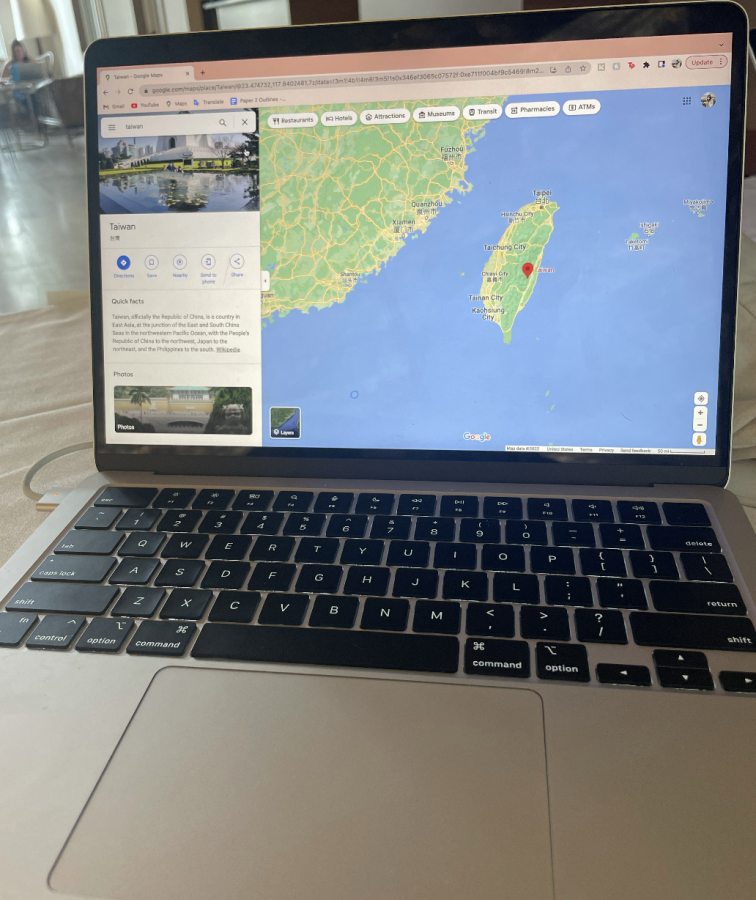Taiwan: Why should we care?
Map of Taiwan on computer to show connection between Taiwan and the Conducters.
What’s the most influential company in the world? Your mind might immediately run to the big tech giants of today: Apple, Google, Samsung, and the like. Perhaps you think of big banks like JP Morgan, oil companies like Shell, or even foreign companies like Tencent and Alibaba. Equally important and yet unheard of, however, is the obscure Taiwan Semiconductor Manufacturing Company Ltd (TSCM).
Our world is run on the digital spectrum. Every message, every control system, every stock market, and every database in the world is run digitally. The globe does its business on laptops, phones, and supercomputers, and our continued reliance on them only seems to grow. Each of these requires microchips: small and incredibly dense sets of billions of circuits, all crammed into a couple of millimeters. And roughly 90% of these microchips are made by the TSCM. The brain of almost every single device you’ve seen, including the device you may be reading this on, is made in Taiwan. The “silicon shield” is a crucial factor in the Taiwan issue, and it forms a crucial reason for why the United States and China care so much about the small island– and why they are doing so much about it.
In Biden’s recent flurry of legislative action: passing bipartisan gun control legislation, large investments in green energy in the fight against climate change, protections for veterans, the elderly, and more, he also made time to address this very problem. The Creating Helpful Incentives to Produce Semiconductors (CHIPS) Act, invested nearly $50 billion dollars in an attempt to cultivate the domestic chip industry and reduce reliance on Taiwan. Although the US and Taiwan are close allies, no nation wants to be as reliant on one another as the world is on Taiwanese chips. Additionally, if Taiwan were to be integrated into China, it would turn from fear into a geopolitical disaster.
For China, however, the situation is much worse. The United States is still friendly with Taiwan, but China has no such luxury. They are similarly investing in their semiconductor industry, but they’re still trailing behind a decade or more. Although the TSCM currently cooperates with them, even locating a few plants in mainland China, there’s no guarantee that this would continue in the future, especially with the increased antagonism from both sides. As tensions heighten, China increasingly sees an invasion as the only option, and they’re preparing for it.
Following Nancy Pelosi’s recent visit to Taiwan, already tense relationships were pushed to a breaking point. Chinese incursions into Taiwanese airspace have risen from around five per day to nearly thirty. Naval incursions were brought into Taiwanese waters and missiles were fired over the island for the first time since 1996. On October 16th, 2022, Party Congress is convening to elect Xi Jinping to an unprecedented third term. Around this time, Chinese citizens were celebrating the national “PLA Day” holiday to celebrate their army. As well as this, there was fierce nationalistic chatter on Chinese social media sites. Because of these factors, Xi Jinping has struck a highly aggressive tone in the Chinese relationship with Taiwan. Whether peacefully or through force, China demands reunification– and the former isn’t the likeliest option.
If China came to declare war on Taiwan, it’s unlikely (but not impossible) that our students could see the frontlines. US policy in the case that this event occurs, nicknamed “strategic ambiguity,” intentionally makes it ambiguous whether we would declare war on China back. We may, or we may not. Such a response would almost certainly set off World War III, with the added flavor of nukes. However, for the United States to sit back and let China grasp hold of Taiwan, in its strong strategic position holding together US East Asian policy as a strong liberal democracy, with almost complete control over every technology manufacturing in the world, would also be too much of a risk to bear.

















